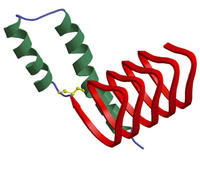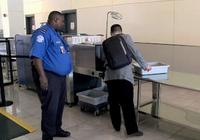-
Cheaper natural gas leads to reduced U.S. carbon emissions
In the United States, lower emission from power plants in 2009 was driven by competitive pricing of natural gas versus coal; Harvard University researchers develop a model which identifies the relationship between the cost of electricity generation from coal and gas and the fraction of electricity generated from coal
-
-
Universal Detection developing smartphone radiation scanner for food
In the wake of Japan’s nuclear disaster at the Fukushima Daiichi atomic energy plant, concerns over contaminated food supplies have swept the nation, sparking Universal Detection Technology to develop a smartphone radiation detector specifically designed for comestibles
-
-
SOUTHCOM deploys radar that sees through foliage, rain, darkness, and dust storms
Lockheed Martin’s TRACER is a light weight, low-frequency synthetic-aperture radar that can peer through foliage, rain, darkness, dust storms, or atmospheric haze to provide real-time, high-quality tactical ground imagery; U.S. Southern Command has just deployed the penetrating radar to support the Command’s counter-terrorism and humanitarian assistance missions, and disaster relief operations
-
-
E-Verify Self Check now available nationwide

Starting yesterday, job hunters in every state across the United States can use Self Check to confirm their employment eligibility status
-
-
Middle school robotics team develops solution to food poisoning

A group of eight middle school students in California has developed an electrolyzed water vending machine that can cheaply and effectively reduce food contamination
-
-
Demand for Israeli security solutions remains strong -- and is growing
Homeland Security NewsWire’s executive editor Eugene K. Chow recently spoke with Koby Tanzer, a partner at Indigo Strategic Partners, an investment firm that specializes in the Israeli security and defense sector; in the interview, Tanzer discusses Indigo’s investment philosophy, how the global recession has affected defense and homeland security spending, trends in the global homeland security market, mobile device-based security solutions, and more
-
-
Kansas fights to keep bio lab project alive

Still reeling from the shock of finding out that the administration’s budget proposal does not contain any construction funds for the $650 million Bio Lab Level 4 facility in their state, Kansas political and business leaders vowed to fight to keep the project alive, including looking for alternative funding sources; the bio lab was considered the anchor of what is called an Animal Health Corridor stretching from Kansas State University in Manhattan, Kansas, to the University of Missouri in Columbia, Missouri
-
-
Raytheon unveils new law enforcement tech center
Last week Raytheon opened the doors for the first time to its new state of the art law enforcement technology center in Downey, California
-
-
GovSec Conference focuses on key security challenges

This year’s annual GovSec Security Conference and Expo aims to train the nation’s law enforcement officials on how to tackle the most pressing national security threats facing the United States
-
-
Using ozone to kill prions dead

Prions are among the worst infectious-disease agents; these proteins are resistant to a wide variety of extreme disinfectant procedures; they have been identified as the culprits behind mad cow disease and chronic wasting disease in animals and humans, and are also implicated in Creutzfeldt-Jakob disease and other prion-related disorders
-
-
Food safety business plan competition
Two Michigan-based organizations announce a business plan competition for ventures in the food safety area; entrepreneurs with new food safety business concepts will compete for $10,000 prize
-
-
Advanced forensic tool for the battlefield
A forensic tool could soon make the analysis of evidence faster and more accurate, giving military investigators an advantage in the wars against drugs and terror
-
-
Accenture develops crime management system for Norway
Accenture is developing a new national crime management system for the Norwegian National Police Directorate (POD) to support police investigations and criminal prosecutions in Norway; the crime management system will enable the Norwegian police force to manage, link, and analyze case information and intelligence for more reliability and consistency across law enforcement, police investigations, border management, emergency response, and case administration
-
-
Compact helmet-display for first responders

Engineers at Physical Optics Corp. are working with DHS’ Science and Technology Directorate (S&T) to develop a helmet-mounted micro display system for first responders designed to improve their situational awareness
-
-
New bill to allow more private screeners at airports

Private security companies could soon be taking over passenger screening at U.S. airports thanks to recently passed legislation that has cleared both the Senate and the House; the proposed law would require that the Transportation Security Administration (TSA) allow airports to switch to private contractors unless it can demonstrate that the move is not cost-effective and hinders security
-
More headlines
The long view
Ransomware Attacks: Death Threats, Endangered Patients and Millions of Dollars in Damages
A ransomware attack on Change Healthcare, a company that processes 15 billion health care transactions annually and deals with 1 in 3 patient records in the United States, is continuing to cause massive disruptions nearly three weeks later. The incident, which started on February 21, has been called the “most significant cyberattack on the U.S. health care system” by the American Hospital Association. It is just the latest example of an increasing trend.
Chinese Government Hackers Targeted Critics of China, U.S. Businesses and Politicians
An indictment was unsealed Monday charging seven nationals of the People’s Republic of China (PRC) with conspiracy to commit computer intrusions and conspiracy to commit wire fraud for their involvement in a PRC-based hacking group that spent approximately 14 years targeting U.S. and foreign critics, businesses, and political officials in furtherance of the PRC’s economic espionage and foreign intelligence objectives.
European Arms Imports Nearly Double, U.S. and French Exports Rise, and Russian Exports Fall Sharply
States in Europe almost doubled their imports of major arms (+94 per cent) between 2014–18 and 2019–23. The United States increased its arms exports by 17 per cent between 2014–18 and 2019–23, while Russia’s arms exports halved. Russia was for the first time the third largest arms exporter, falling just behind France.
LNG Exports Have Had No Impact on Domestic Energy Costs: Analysis
U.S. liquified natural gas (LNG) exports have not had any sustained and significant direct impact on U.S. natural gas prices and have, in fact, spurred production and productivity gains, which contribute to downward pressure on domestic prices.
